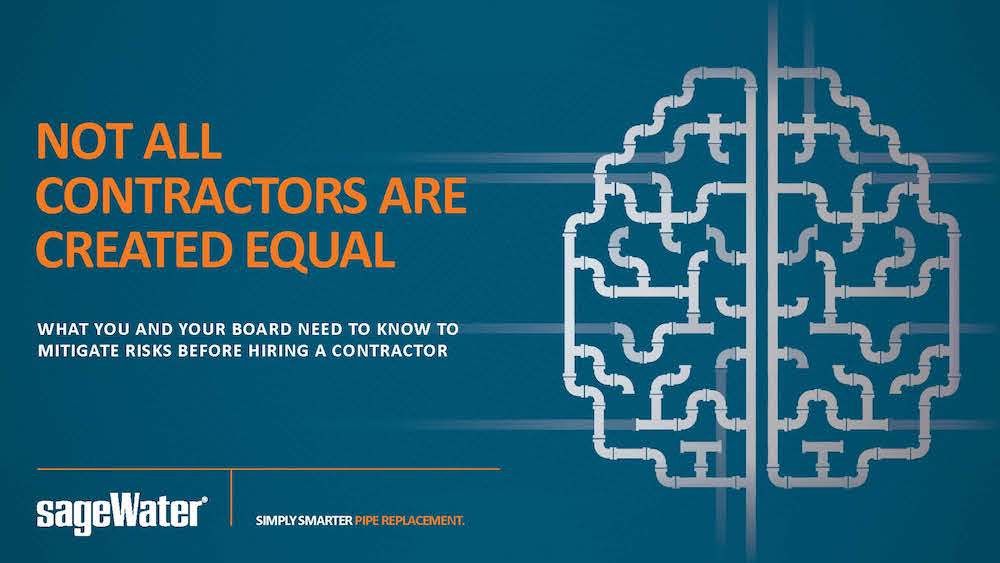
When COVID-19 first hit our shores in the spring of 2020, no one knew what to expect or how long it would last. Now, more than six months into what is the largest global pandemic of our lifetime, we are seeing signs of life return to normal while we continue to live with the fears and concerns about this deadly virus. Masks are the new normal, social distancing is everywhere, and everything from how we go to school to shop for groceries has changed.
But many things have not stopped for COVID. Weather continues to wreak havoc across the country, time marches on, infrastructure ages, and our use of core building systems (plumbing, electrical, HVAC, etc.) has continued – even increased – with more people at home all day for work or school.
The ongoing use of core building infrastructure requires continued maintenance for communities. From high-rise buildings to garden style apartments, condos, co-op, or rental communities, everyone is dealing with the same issues they had before COVID-19 hit. Pipes that clogged regularly before the pandemic are still clogging today. Concrete spalling that started last year has not magically gone away on its own. Broken window seals have not fixed themselves. But like everything else, maintenance and capital improvements are now clouded by the realities of getting work done during COVID. So what’s a community to do?
As a critical infrastructure provider replacing plumbing in occupied communities for the past 30 years, including throughout the pandemic, we’ve learned some valuable lessons about leading a capital improvement project during COVID-19.
Here’s what to look for in a contractor and how to manage your community if you have a capital improvement project that simply cannot wait until COVID goes away.
#1: Survey Your Community
Now more than ever, it’s critical for communities to prioritize what must get done versus what can wait another year or two. Hearing from owners, residents, and tenants about what they feel needs to be fixed is a good place to start. Likewise, gathering information about their willingness to undertake work, and their fears about having contractors onsite, is helpful when weighing the risk/reward of getting a project completed now versus in the future.
All things being equal, outdoor projects like roof repairs, building façade improvements, parking lot work, landscaping, exterior lighting, and pool work are less risky than interior work as it relates to COVID.
If interior work is required, common area improvements may afford less exposure to residents than in unit work. It’s easy to close off a game room or an elevator for the day to keep your residents away from workers. If in unit work is required, make sure it’s critical. Plumbing and HVAC repairs are essential services for proper sanitation and air movement, both of critical importance during COVID-19. New carpet, light fixtures, and paint can usually wait.
#2: Check Vendor Protocols
Some vendors have addressed COVID-19 head on, while others have simply ignored it. When evaluating contractors for projects, ask what their safety protocols are for handling COVID.
- Do they have regular health screenings, check temperatures, and monitor their employees daily?
- Do they use Personal Protective Equipment (PPE) like masks and gloves to reduce the likelihood of transmission?
- What are their cleaning and sanitizing protocols?
- What is their response protocol if a member of their team gets sick?
- Do they quarantine everyone, or just send the sick employee home and hope he has not gotten the others sick?
In our new normal, these are all fair questions to ask a contractor before having them start a project at your community.
#3: Reconfirm Pricing and Timing
Some vendors have seen their book of business crash as a result of COVID-19, and they are offering deals or incentives to get back to work now. Check with your contractor to see if they have any special offers and confirm project timing.
Many supply lines have been significantly impacted by COVID, and some materials may not be readily available. Thinking of doing kitchen renovations across your community this winter? Think again… there is currently up to a three-month backlog for many major appliances like refrigerators due to delays in parts production, factory shutdowns, and shipping delays.
#4: Overcommunicate
Everyone is a little uneasy given the uncertainty surrounding COVID-19. Overcommunicating with your community about your plans, why now, the protocols in place, contingency plans, what to do if someone in their home gets sick, and more, are all essential to make sure any projects undertaken go off without a hitch. Informing your community up front and allowing plenty of time for their questions to surface and get answered is the best way to avoid conflict when your contractor shows up to start the project.
#5: Have a Contingency Plan with Your Contractor
Even the best laid plans can go awry during a global pandemic. Before work begins, determine what will happen in the event of various COVID-19 scenarios. What is your contractor’s plan if their whole crew gets quarantined? Will work stop, or are there other resources who can come in and keep the job moving? Likewise, what happens if you need to stop work due to an outbreak among the residents at your community? Will the contractor charge delay fees, or are their clauses in the contract to help mitigate this unfortunate circumstance? In the end, we are living and operating in a different environment, with new protocols emerging daily. Work must continue in order to maintain our communities, but how we work has changed.



